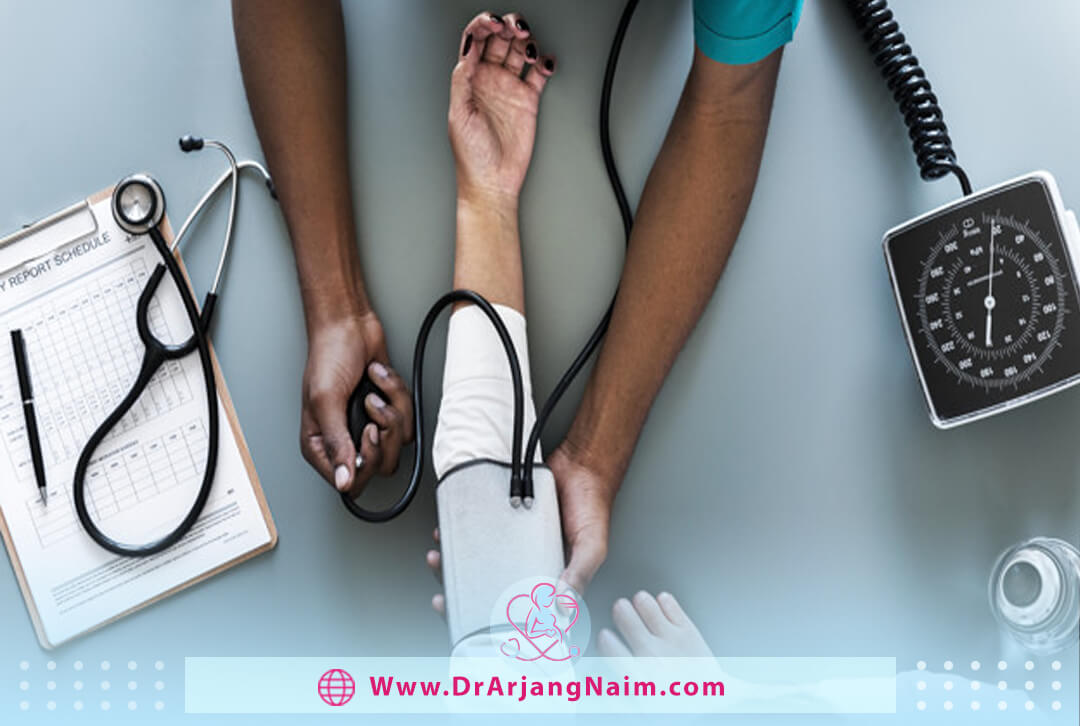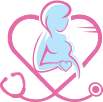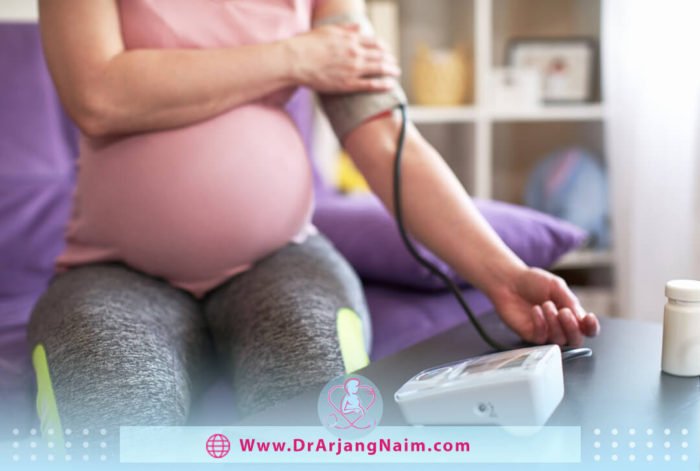One of the problems that some pregnant women suffer from is Hypertension in pregnancy. Blood pressure is called the systolic pressure drop on diastolic pressure. The higher number is the systolic pressure inside the arteries and indicates the amount of pressure that pumps blood to the arteries when the heart contracts. A lower diastolic pressure indicates the amount of blood pressure at rest.
How many times should pregnant women measure blood pressure during pregnancy?
Measuring a pregnant woman’s blood pressure is necessary at every visit, and its naturalness is one of the most important factors in maternal and fetal health.
To determine your “normal” pressure during pregnancy, your doctor will probably measure your blood pressure as a baseline at your first visit. It then retakes your blood pressure at each visit and compares it to baseline blood pressure.
Attention to maternal pressure is because the abnormal increase in blood pressure is quickly identified. On the other hand, there are other dangerous symptoms that, if combined with Hypertension, are life-threatening for the mother and fetus.
Normal blood pressure during pregnancy
Normal pressure is usually around twelve to eight millimeters of mercury. Pressure lower than 90/60 mm Hg indicates hypotension and hypertension if it is higher than 140/90 mm Hg during pregnancy.
What is hypertension during pregnancy?

Measuring blood pressure and showing values greater than 140 over 90 or 140/90mmHg is called hypertension. It usually has no detectable symptoms unless the pressure is too high. If the mother’s blood pressure is high several times after the 20th week of pregnancy, your doctor may order a urine test to check for pregnancy poisoning or preeclampsia.
Preeclampsia is a serious condition in which blood pressure rises during pregnancy. Protein in urine, liver and kidney disorders, headache, or vision changes occur. If there are no symptoms of preeclampsia and only the mother’s hypertension, her doctor will diagnose gestational hypertension.
If the mother has hypertension before pregnancy or before the 20th week of pregnancy, she has chronic high blood pressure, which differs from high blood pressure during pregnancy.
Types
- Gestational hypertension: Women with hypertension during pregnancy have high blood pressure after the twentieth week. There is no extra protein in the urine or any signs of organ damage.
- Chronic hypertension in pregnancy: Chronic hypertension is high blood pressure before the twentieth week of pregnancy. But because hypertension during pregnancy usually has no symptoms, it can be difficult to determine when to start.
- Preeclampsia: Sometimes, chronic hypertension during pregnancy leads to preeclampsia, a complication of high blood pressure pregnancy and a sign of damage to another body organ. Preeclampsia is high blood pressure that occurs after 20 weeks of pregnancy. If untreated, preeclampsia can cause serious complications for both mother and baby. Previously, preeclampsia was only diagnosed if a pregnant woman had protein in her urine and high blood pressure, but now it is known without protein in the urine.
- Chronic hypertension with preeclampsia occurs in women with chronic hypertension before pregnancy, after which the blood pressure rises, and protein is found in the urine or causes other complications during pregnancy.
Causes
There are several reasons for these conditions, including:
- Being overweight or obese
- Lack of movement
- Drinking alcohol
- Smoking
- A family history of pregnancy-related hypertension
- Age (over 35)
- First-time pregnancy
- Carrying more than one child
- Use of assisted reproductive technologies (such as IVF)
- Having diabetes or certain autoimmune diseases
Why is hypertension dangerous during pregnancy?
Hypertension in pregnancy poses several risks, including:
- Reduced blood flow to the placenta: If your placenta is not getting enough blood, your baby may be getting less oxygen and less nutrients. This condition can lead to low birth weight, slow growth, or premature birth.
- Placental abruption: Preeclampsia increases the risk of developing the disease in which the placenta separates from the inner wall of your uterus before delivery.
- Intrauterine growth restriction: Slow down the growth of the fetus.
- Future cardiovascular disease: Preeclampsia may increase the risk of future cardiovascular disease. If you have preeclampsia more than once or have a preterm birth due to high blood pressure during pregnancy, you are more likely to develop cardiovascular disease.
- Premature delivery: Premature delivery is sometimes necessary to prevent potentially life-threatening complications of high blood pressure during pregnancy.
Symptoms

Many women who have Hypertension during pregnancy have no symptoms, so it is recommended that you have your blood pressure checked regularly by your doctor or midwife during pregnancy. A urine test is also very important for diagnosing preeclampsia from urine protein.
However, you should be very careful about a number of symptoms because they can be symptoms of preeclampsia. If you have any of these symptoms, you should urgently see your doctor or midwife to check your blood pressure and urine test. These symptoms include:
- Severe headache
- Vision problems, such as blurred vision or seeing bright spots in front of the eyes
- Abdominal or stomach pain. Preeclampsia pain usually occurs in the upper abdomen, just below the ribs, and especially on the right side.
- Late vomiting in pregnancy (not early morning nausea)
- Feeling bored
- Decreased levels of platelets in your blood
- Shortness of breath
Prevention
Risk factors commonly contributing to Hypertension in pregnancy, such as obesity and a history of high blood pressure, can be controlled with proper exercise and diet. Although weight gain is unavoidable during pregnancy, it is still recommended that pregnant women consult their doctor about the right amount of weight gain that will not harm their health.
During pregnancy, in addition to physical and psychological changes, the person also suffers from hormonal changes, which causes stress, making it more difficult to manage blood pressure in these people. For this reason, pregnant women should use stress reduction methods, such as yoga and meditation.
Treatment
Some common blood pressure medications are not suitable for pregnant women. Do not use these medicines to lower your blood pressure during pregnancy:
- ACE inhibitors
- Renin-inhibitors
- Angiotensin receptor blockers
These medications, especially through the bloodstream, are transmitted to the developing baby and affect his health. These can also dilute the blood, affecting the mother’s ability to hold the fetus. Methyldopa and labetalol are both drugs that are not harmful to controlling blood pressure during pregnancy. If you develop high blood pressure during pregnancy, be sure to talk to your doctor about controlling your blood pressure.
What can I do to reduce the risk of complications?
Proper self-care is the best way to take care of a child. For example:
- Use your medication as prescribed: Regular and timely use of medications effectively controls the condition. Therefore, take medicine according to your doctor’s instructions and do not stop taking them arbitrarily.
- Keep your prenatal appointments: Regular visits to the obstetrician and timely checkups can reduce the potential risks.
- Stay active: Performing light exercises during pregnancy, in addition to controlling blood pressure, reduces stress and increases blood circulation
- Eat a healthy diet: Although the body needs a small amount of sodium, too much causes high blood pressure. Try substituting cumin and lemon pepper for salt. Washing canned foods can also reduce their salt content. Also, try not to use processed foods as much as possible. Eat whole grains and foods rich in potassium. Bananas, sweet potatoes, plums, raisins, beans, and tomatoes are high in potassium.
- Avoid smoking, alcohol, and illicit drugs: Avoiding smoking and alcohol consumption during pregnancy is essential for the safety and health of the baby. In addition, alcohol and smoking can cause hypertension. If you are pregnant and still smoke or drink alcohol, have a plan to quit it.
- Destress: Stress can raise your blood pressure. So try to eliminate the things that cause anxiety and do meditation, yoga, or breathing techniques to promote relaxation. Finally, these can help you manage labor pains, so prepare for the day.
- Weight control: You must have heard it said that you should eat as much as two people during pregnancy, but this is not true. Being overweight raises blood pressure, so follow a balanced diet. Nutritionists can help you to have a healthy diet
The bottom line
If high blood pressure is not treated during pregnancy, it can be dangerous for both mother and baby. Therefore, it is important to consult an obstetrician about any symptoms or concerns. In general, careful monitoring and some lifestyle changes can reduce the risk of complications from high blood pressure.
Additional questions
- What do blood pressure numbers mean?
A blood pressure measurement has two numbers separated by a slash. For example, a 110/80 mm Hg blood pressure is called “110 over 80”. The first number is the pressure exerted on the artery walls during the contraction of the heart. This is called systolic blood pressure. The second number is the pressure exerted on the artery walls when the heart relaxes between contractions. This is called diastolic blood pressure.
- What is chronic hypertension?
Chronic hypertension is a woman’s high blood pressure before pregnancy or develops in the first half of pregnancy (before the 20th week of pregnancy).
- What happens after delivery if the blood pressure is chronic?
After delivery, you should monitor your blood pressure at home for 1-2 weeks. Blood pressure often increases in the weeks after delivery. You may need to take medication, or your dose may need to be adjusted.
- How does preeclampsia affect the body?
Preeclampsia can lead to conditions that cause seizures and strokes. Preeclampsia can cause HELLP syndrome. HELLP stands for hemolysis, elevated liver enzymes, and low platelet count. HELLP syndrome damages or destroys red blood cells and interferes with blood clotting. It can also cause chest pain, abdominal pain, and bleeding in the liver. HELLP syndrome is a medical emergency. Women may die from HELLP syndrome. They can also have lifelong health problems from the disease.
- How is preeclampsia managed?
The mother and doctor should discuss how to manage her condition. The goal is to limit complications for the mother and give birth to the healthiest baby possible.
References
https://emedicine.medscape.com/article/261435-overview
https://www.mayoclinic.org/healthy-lifestyle/pregnancy-week-by-week/in-depth/pregnancy/art-20046098
https://my.clevelandclinic.org/health/diseases/4497-gestational-hypertension
https://www.acog.org/womens-health/faqs/preeclampsia-and-high-blood-pressure-during-pregnancy
https://www.marchofdimes.org/find-support/topics/pregnancy/high-blood-pressure-during-pregnancy




